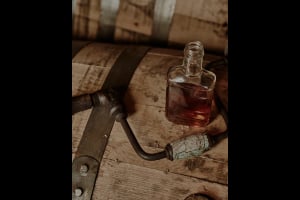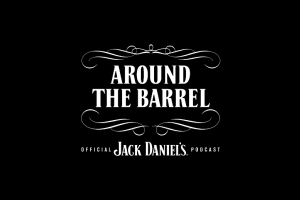BYRON COPELAND ∙ LYNCHBURG, TN
NJAI LEADERSHIP ACCELERATION PROGRAM LEAD
Before being selected to the Nearest and Jack Advancement Initiative, my last role was making barrels for Jack Daniel’s Tennessee Whiskey. My goal is to make this experience count every day with every interaction. As the first person selected in this program by Jack Daniel’s, my purpose is to make sure that I can do whatever is necessary to make this program successful.
How does the legacy of Nathan ‘Nearest’ Green drive you at work?
When I think about Nathan’s Legacy, I think about how I came to this small town of Lynchburg a year ago and was accepted into this small community. When I walked into the distillery, I had a standard I held myself to as I met people and showed them who I am as a person. Generally speaking, we know that Black Americans have played a huge role in shaping this country’s legacy. Nathan had to overcome so much to build the legacy that he holds today. A legacy is part of a family built to last. If I can be one-tenth of Nathan’s legacy, I can say my life was a success.
What’s the most important factor when you consider building upon the Green family legacy?
All I can say is Wow! That legacy was built long before working here at the Jack Daniel Distillery. I think about those who have come before me. Somebody had to get through some challenges in order to have a legacy and to be remembered. When I think about Nathan, I think about what he went through as an enslaved man who taught a young boy, Jack Daniel, how to make whiskey. He treated him with kindness while building a legacy. I want people to remember me as someone who treats others how I’d want to be treated, breaking down barriers while pulling others up with me. It’s not just about me, but about other people too.
What’s been your biggest challenge in continuing the Green family legacy?
I’d like to say it's not only my challenge. In my role, I meet people and show them what diversity looks like in the industry. I’m showing them we don’t have to be at the lower level or the frontline leaders. We can be in the rooms making decisions and commitments. I want those who see me and those who look like me to open their arms and embrace diversity, equity, and inclusion (DEI). I’d like to say I’m a part of it, but if we can get more allies to see that (DEI) is needed, then hopefully that’s the end-all. I’m trying to spread the word that Black people need to be at every level in all industries and not just whiskey. The challenge is to get to an equitable place where it’s not only frontline workers. I’m going to do everything I can to help push this forward for those coming up behind me.
Do you think the Green legacy is defined more by the family or the whiskey?
I will tell you it’s more defined by the family. We can talk about what’s in the bottle, but it’s the people in Lynchburg, TN who are family. Nearest Green taught Jack Daniel how to make whiskey, but that’s not the most important part. The most important part is family. I truly believe Jack was with the Green family as a family. You have to put family first and then you can tie in the whiskey. The whiskey is known around the world. It’s important to hear about Nathan and how it all started from family. You have to put the love of family first and foremost before the whiskey.
What inspiration do you draw from the Green family legacy and how does it guide you from your day-to-day?
The inspiration that I draw is one of courage and one of community. I look at their family as part of my ancestors as in all black people. When I mention the Green family, I’m truly talking about them as a whole and what it means to stand up holding your head up high representing all our ancestors.
What is your favorite memory with the Green family?
One of the most memorable times working with the Green family was when we had the dedication of the George Green Barrel House and spent time with them. They had a family reunion with about 200 family members including the ones who work here: Debbie Staples, Jackie Hardin, and Jerome Vance. Being able to spend time with them made it feel like I was a part of their family. I shared with them why I was here at the Distillery. Being able to work with them and seeing how elated their family was when the bell dropped to announce the re-naming of Barrel House 114, the oldest and most prominent barrel house in Lynchburg, to the “George Green Barrel House” in honor of Nathan “Nearest” Green’s son and the extended Green family. I also got a chance to dance in front of them when they called me to the dance floor, which was pretty embarrassing–but also made me feel like I was part of their family. For me, keeping the legacy of a family together is very important.
What’s one of your favorite memories with someone in your family?
My grandmother was 102 years old when I was a little kid. She was born in 1899 and shared some of the things that she had gone through. It was tremendous for me that my family always goes back to our roots. I’m one of the youngest out of my family where I got to host a family reunion a couple of years ago and that was the passing of the torch. I remember my great aunt would stand up at our family reunion to tell stories about our lineage, where we came from, and why family is important. For me, I want to continue that and instill that with my kids. Family is first and foremost important. That is what I truly believe in.
Knowing you’re part of a generational story with Jack Daniel’s, do you feel like you have a responsibility to shape black history in the spirits industry?
I’ll tell you that my responsibility and part of what I’m given in my position is to go out and knock down barriers. I truly believe diversity, equity and inclusion is the be-all and end-all. Black History can’t be defined in one moment. Black History is very important as it was passed down by generations and generations. My parents taught me and I teach my kids about it. I know that it’s not just only defined by me, but by many people. We need this moment in time to keep passing the torch. That is Black History. When we see Black people in this industry and outside the industry at top-level management positions at big corporations then we can say what I’m doing here has helped change history.



